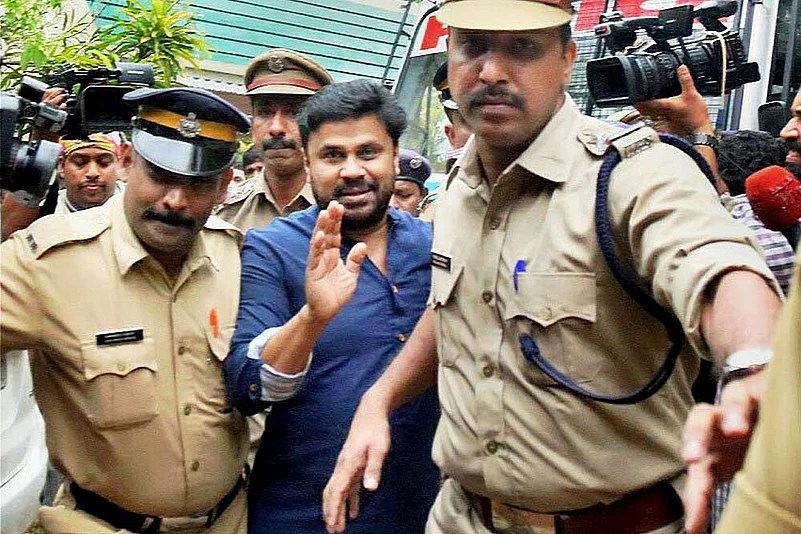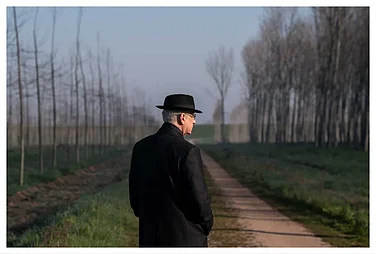Macbeth’s heinous crime, in the Shakespearean tragedy, pales in comparison with what Dileep is suspected to have done. Vaulting ambition spurred both men to erase anyone who stood in their way: the 11th-century Scottish noble committed regicide, while the Malayalam star systematically marginalised colleagues who challenged his turf or ego. The 48-year-old, largely known for his comedy-tinged act in family films, also portrayed some of the most sensitive roles in Mollywood. Yet, apparent vindictiveness eventually saw him fall from the heights of popularity.
Kerala is still reeling under the news of the star’s diabolic crime. It’s an evil contract that was sealed, a conspiracy the actor is said to have hatched three years ago. Dileep allegedly got a driver, aided by a gang of five, to abduct and sexually assault an actress-colleague—and get the act filmed. That task was finally carried out on February 17, just off Kochi. Police say Dileep wanted to exact revenge for, in 2013, she had reported an extra-marital affair of his to his wife, actress Manju Warrier, which led to their divorce.
Police nabbed Sunil Kumar aka Pulsar Suni, a contract driver for Lal Creations, was allegedly hired for the molestation job by Dilip in February. This month, they closed in on Dileep as the conspirator. After 25 hours of interrogation across two days, the actor too was arrested. Their remand report, submitted to court, has enough evidence by way of phone calls and witnesses that shore up the conspiracy line. Kerala retched and a chunk of Dileep fans deserted him (though Facebook does feature posts claiming his innocence and yearning for his comeback to movies). On July 10, as Dileep stepped into the police van amid a drizzle in his native Aluva, he calibrated his walk to one of casual confidence and put up a smile. The crowds showed no sympathy, though, and derisively chanted the title of his film, Welcome To Central Jail. Ditto outside the sub-jail. The residents of this town in Ernakulam district whisper that he was a fraud and capable of such an act.

It’s a story worthy of a film. The transition from a young Gopalakrishnan P.P. to actor Dileep—and a parallel inner journey that evidently saw an innocent soul morph into a cold-hearted manipulator. The actor’s beginnings were humble: his father ran a rice mill in Aluva’s Desom, which brought insufficient money to raise the three siblings—Dileep was the eldest. His classmates remember those days in 1987-90 when the history student would come to college (Maharaja’s, Ernakulam) wearing an ill-fitting shirt and jeans. Also, kolhapuri chappals that had undergone several repairs, recalls a classmate, keen to hide his name now for fear of retaliation. “Dileep would thus lag behind. He displayed a humility that was excessive and, in hindsight farcical,” the man recalls. “He was a mimicry artiste and could perfectly imitate stars.”
Soon, the youngster got an opportunity to perform on stage. That was in a play, Kudukka. After that, he joined mimicry troupe Harisree on its two-month tour of north India. It enabled him to imbibe the art of stage performance. On return, he gave his family his entire earnings of Rs 2,000. Extremely superstitious, Dileep had been told he would become a superstar; so his next step was the movies. He did not have the looks or physique of a superstar, but believed he was destined to be one, according to his former friends. And he worked hard at building contacts in the industry, from the set boys to the directors. Dileep would visit all locations where movie scenes featuring leading
actor Jayaram were being shot. He soon endeared himself to Jayaram; even managed entry into his room as an admirer. When he returned after each visit, Dileep would have adopted the mannerisms of Jayaram—himself a mimicry artiste-turned-actor. Dileep would regale friends with his acts. Jayaram introduced him to director Kamal, who took him on as assistant director in Vishnu Lokam (1991). He started creating small roles for himself and soon got opportunities to do them. He changed his name to Dileep. That’s when some noticed his first change: he avoided talking to his old friends.
It was Mannathe Kottaram (1995) that established him as a second-tier hero after Mammootty and Mohanlal. Soon Dileep was replacing Jayaram. In 1998, he married Manju, a highly talented actress. It is said Dileep believed she brought him luck. The reverse didn’t quite hold: Manju had to quit acting on his say-so.
Soon Dileep’s films were doing well at the box office, as he kept experimenting with themes and roles. Then, according to director Vinayan (Dileep acted in seven of his films between the late 1990s and 2000s) there was a visible change in the man up his journey. “When we started out, he would only stand in front of me. Then he would sit on the floor beside my chair. I always suspected this kind of humility,” he notes. “Later he started dictating who should be the co-stars, producer and scriptwriter. We parted ways.” It was also rumoured by now that Dileep’s fans association would boo down a rival actor’s film till it flopped.
The next issue for Vinayan was in 2007 when he was general secretary of the cine technical artiste’s federation MACTA. “Director Thulasidas had complained that Dileep had taken Rs 40 lakh from a producer and refused to give a date for 18 months,” he says. “Then he promised the producer he would do a new film with him on the condition that Thulasi wouldn’t direct it.”
MACTA was at that time pushing for a contractual agreement with all actors that would hold in court, so that such situations would not rise. “We decided that if Dileep didn’t honour his commitment, nobody would direct his films.” In 2009, Dileep, well-established and active with the Association of Malayalam Movie Artistes (AMMA), coaxed half the members of MACTA to leave that body, promising them dates with other superstars. The 1993-formed MACTA split in half.
In November 2009, Dileep formed another union, FEFKA. A year before, when AMMA was struggling to raise funds, it was Dileep’s Graand Productions that produced Twenty:20 with a big star cast. The high-grosser brought in funds for the organisation, making Dileep quite powerful. AMMA decreed that its members would not act in Vinayan’s films. Iconic actor Thilakan disregarded the ban and acted in Vinayan’s films, only to face a ban himself—the septuagenarian had to return to theatre to make a living.
In 2014, with talk of an affair on the side all over, Dileep divorced Manju. Thereafter, as she returned to films, he reportedly tried his best to thwart her projects.
Dileep was also investing in real estate. Recent police investigations find he had for the past 11 years been involved in 35 land dealings in Kochi alone. He was also buying up properties in Aluva and neighbouring Nedumbassery, besides Chalakudy near Thrissur and hilly Idukki district. Meanwhile, as he became more powerful across the industry, Dileep was in every association, whether it was of actors, directors, exhibitors or producers, thus being able to control all facets. Last year, the Kerala Film Exhibitors’ Federation were negotiating for the same percentage in profits as theatres in malls. Dileep split the outfit and formed FEUOK (Film Exhibitors’ United Organisation) this January. Says producer-cum-theatre owner ‘Liberty’ Basheer: “My theatres were closed down for four months because of a ban on screening films there. Dileep was behind this.”
Dileep also started a popular eatery called Dhe Puttu besides a theatre, D Cinemaas, in Chalakudy. Plans were afoot to build a state-of-the-art, five-theatre complex. Today, people in Aluva want the police to probe his alleged benami deals. “Dileep has properties in one- and two-tier benamis. The closest to him are one-tier,” an Aluvaite tells Outlook.
It was this February 17 Dileep allegedly engineered the crime that led to his arrest. Five months after the 30-year-old actress was abducted and molested in a moving car, the police found evidence of a conspiracy between the main accused Pulsar Sunil and Dileep. The actor, it is alleged, had promised to pay Sunil Rs 1.5 crore for a clipping of the actress in the nude. Dileep did not honour the promise. Soon Sunil wrote to the star, sending the letter through his jail cellmate. He also called Dileep’s manager and actor-friend Nadirshah. Dileep, who had given a police complaint for blackmail, found the police investigating him instead.
It was hubris, for Dileep had an exaggerated sense of himself that made him value himself not as an individual but almost an industry. Even today, people suspect he will do a Houdini act and escape the legal clauses to walk free. If the cases against him stand, Dileep is likely to spend 20 years in jail. He is now lodged in the same cell where he once managed to lock producer Dinesh Panicker up. Dileep’s sins, according to his enemies, have had a cumulative effect.
***

Up The Ladder
- Dileep’s father ran a rice mill in Aluva, struggling to bring up three children
- A mimicry artiste, Dileep quickly mastered the art of stage shows
- Proximity with actor Jayaram helped him enter Malayalam cinema, initially with small roles he himself suggested
- Mannathe Kottaram (1995) earned Dileep fame; three years later he married leading actress Manju Warrier
- A master string-puller, Dileep helmed most Malayalam movie associations. He floated a film production firm and also began investing heavily in real estate.
By Minu Ittyipe in Kochi


























